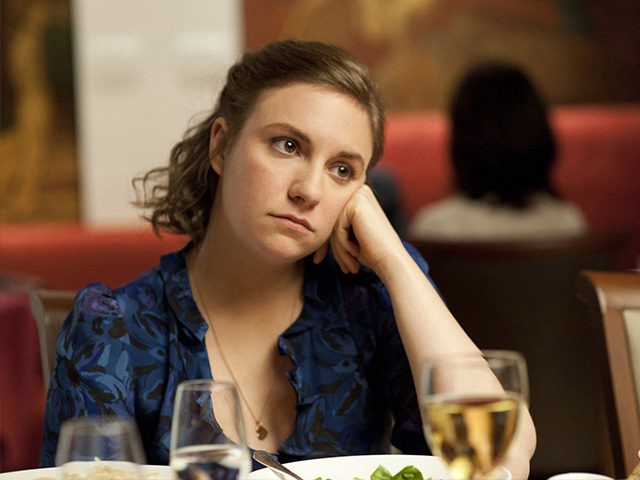Lena Dunham represents the pinnacle of millennial feminist success. She’s a strong, independent woman who relies on victimhood to make headlines. She makes millions of dollars a year, but insists the wage gap is real. Most importantly, she derides conservatives as puritanical, but she is the first to be offended.
As the founder and Monday editor of Bright, a daily news and culture email for women, I subscribe to lots of other emails, including Lena Dunham’s Lenny. It has the usual feminist, self-important drivel you would expect. Imagine my shock when I received the Friday Lenny with the subject line “I Am Not a Feminist.” The line was uttered by the iconic Estee Adoram, booker for the Comedy Cellar in New York. The Comedy Cellar – and Adoram – has launched and sustained the careers of many great comedians, including Louis CK, Chris Rock, Nick DiPaolo, Jim Norton, Colin Quinn, Sherrod Small, Jeff Ross and Darrell Hammond, among many others. Needless to say, Adoram is a woman who is unflappable.
In her newsletter, Dunham recounts that she approached Adoram one night after seeing an impromptu show by her “friend and collaborator” Judd Apatow. It’s a common theme in Dunham’s writing, as well as other privileged millennials, to insist they are so awkward and weird while dropping clues about their hipness. Dunham wrote:
“Estee is the boss around here,” Judd explained. “Everything that happens is because of Estee.”
“Wow. Could I interview you for my feminist newsletter?” I blurted, immediately horrified that I had chosen this moment to wheel and deal.
“Sure,” she shrugged, as if this were a request she got hourly. “But I am not a feminist.”
I have to give credit to Dunham for still pursuing the interview. In fact, she wrote, “I would have honestly denounced feminism and all its trappings in that moment just to make [Adoram] like me.”
(Don’t hold your breath.)
It’s clear that Dunham and Adoram could not be more different in their career path. Adoram served in the Israeli Army before becoming a hostess at the Comedy Cellar, and then eventually worked her way up to the most important job there. Dunham started with a series on HBO and Emmy nominations after the first season. Basically, Adoram has been successful in the male-dominated fields of the military and comedy and Dunham is dying to get her to join her cult of victimization. Adoram ain’t having it and it’s a beautiful thing to see.
Here’s a selection of Adoram’s responses to Dunham’s loaded questions.
On lack of females in comedy:
“I am not gonna put someone on who is not great just because she’s female. And I really don’t believe any club owner would not book a woman just because she’s a woman. There’s only one trend in comedy and that’s to be funny. I don’t go for gimmicks.”
On what offends her:
“I hate vulgarity. I don’t mind dirty. There’s a difference between a comic who works dirty or is vulgar. I don’t want the level of intelligence to go down the toilet because of that. I have personal stuff that I don’t like. I wouldn’t be offended, but I don’t like it. I don’t like Holocaust jokes.”
On rape jokes:
“Depends on how you do it. You need to come and you’re going to listen to Lynne Koplitz doing the rape joke. If you don’t laugh, I’ll buy you whatever you want.”
On being stepped over in the business because she’s a woman:
“Maybe they say things behind my back, I don’t know. But no, I never felt it. I can’t even think of an incident of somebody trying.”
On whether the feminist ideology defines her:
“I was always in the position of authority, even when I was in the army. I was always in the position of authority.”
“I was in charge. I have pictures to show, to prove it. There is something in my character, I guess, that makes it happen. I never felt: ‘I am not allowed to do that because I’m a woman.’ Feminism would step in and say, this is a blockage here. I never felt that. I worked, I worked hard, and I always was recognized for the job.”
“The reality is, most people that I come in contact with give me my dues.”
On “equal pay”:
“Now, there’s the big thing in show business. Equal pay for women and whatever. It probably is an issue. To me it’s not. Yeah, I would like to make more money, of course. At the end of the day, for me, what matters is the satisfaction with what I do, my relationship with people, whether it’s comics, coworkers, friends, people I meet. I feel happy. As long as I have enough to live for what I want to do, I’m good. I don’t know if it’s words of wisdom, but that’s what kept me happy.”
Clearly, Estee Adoram is the refreshing kind of broad who probably doesn’t mind being called a broad. I identify with her more than I do with Dunham and today’s feminist heroes. Hollywood should take note. We have enough movies and TV shows about the lives of vapid, self-important millennials like Lena Dunham. Give us more on the inspiring women like Adoram who came before them and don’t subscribe to the victimhood worldview.

COMMENTS
Please let us know if you're having issues with commenting.